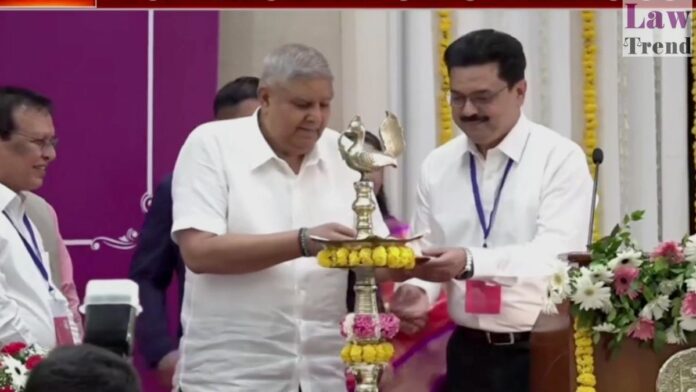Vice President Jagdeep Dhankhar on Tuesday reignited the debate on constitutional supremacy and the role of the judiciary, declaring that Parliament is the “supreme” institution under the Constitution and asserting that “there cannot be any authority above” elected representatives.
Speaking at an event at Delhi University, Mr. Dhankhar—who also serves as Chairperson of the Rajya Sabha—asserted that “elected representatives are the ultimate masters of what the Constitution will be” and took aim at the judiciary’s interpretation of constitutional provisions, including the Preamble and Article 142.
“In one case, the Supreme Court says the Preamble is not part of the Constitution… in another it says it is. But let there be no doubt—the elected representatives will be the ultimate masters of what the Constitution will be,” Mr. Dhankhar stated, referring to divergent rulings in the 1967 Golaknath and 1973 Kesavananda Bharati cases.
He further criticised the top court’s validation of the Emergency imposed in 1975, calling it “the darkest phase in democratic history” and questioning how the judiciary could uphold suspension of fundamental rights against the views of nine High Courts.
“I say ‘darkest’ because the highest court in the land ignored the verdict of nine High Courts… that democracy’s fundamental rights could never be put on hold,” he said, adding, “It was held by the Supreme Court… as the sole arbiter of fundamental rights.”
‘Article 142 a Nuclear Missile’
Mr. Dhankhar also reiterated his controversial stance on Article 142 of the Constitution, which empowers the Supreme Court to issue orders necessary for “complete justice.” He likened the provision to a “nuclear missile” in the hands of the judiciary.
“Article 142 has become a nuclear missile against democratic forces, available to the judiciary 24×7,” he said, days after the Supreme Court directed deadlines for Governors and the President to clear bills passed by state legislatures.
Political Reactions and Pushback
The Vice President’s remarks drew sharp reactions from legal and political quarters. Senior Congress leader and senior advocate Abhishek Manu Singhvi called the statements “unwarranted,” stressing that constitutional functionaries like the Vice President should refrain from commenting on such matters.
“The President does not comment on such issues. The same standard should apply to the Vice President,” Singhvi said, adding that Article 142 has often been invoked to uphold justice in extraordinary situations.
Mr. Dhankhar’s comments come in the backdrop of similar attacks from ruling party members, including BJP MP Nishikant Dubey, who had criticised the apex court’s decision in the Governor’s bill clearance case, saying:
“If one has to go to the Supreme Court for everything, then Parliament and State Assembly should be shut.”
The BJP has since distanced itself from such comments, calling them “personal opinions.” However, the Attorney General of India has been approached for sanction to initiate criminal contempt proceedings against Dubey, particularly over his remarks accusing the Supreme Court of “taking the country towards anarchy” and blaming Chief Justice Sanjiv Khanna for national unrest.
Judicial Responses
The judiciary, meanwhile, responded with restraint. Justice Surya Kant, in an unrelated contempt hearing, noted:
“We are not worried about the institution part—the institution comes under attack every day.”
And Justice BR Gavai, the incoming Chief Justice of India, commented sardonically while hearing a plea on West Bengal violence:
“You want us to issue a Writ of Mandamus to the President? As it is, we are already facing allegations of encroaching into the Executive…”
Former Supreme Court judge Justice Ajay Rastogi also weighed in, stating that judicial interpretations can always be addressed through constitutional amendments by Parliament.
“If there is disagreement, Parliament always has the power to amend the Constitution.”




